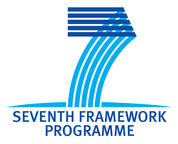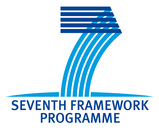Programme of "Involving Citizens in Emergency Preparedness and Response Workshop" in Istanbul5/16/2014 The tentative schedule for the COSMIC Involving Citizens in Emergency Preparedness and Response Workshop, to be held in Istanbul is now ready.
Involving Citizens in Emergency Preparedness and Response International Workshop Location: Koç University Research Center for Anatolian Civilizations, Istanbul Date: September 4, 2014; Thursday For further information about the Workshop, please visit the workshop webpage at MiXLab.
0 Comments
COSMIC (Contribution of Social Media in Crisis Management) project partners MixLab at Koç University and Hellenic Rescue Team has drafted a report on Citizens' Involvement in Emergency Communications. The report seeks to examine the various roles that citizens may have in communications during emergencies. Also, the report maps the relationship between the use of different types of media and communication technologies—including mass media, as well as new media technologies—and citizens’ involvement in emergency communications as,
The report also discusses social activism as a form of citizen involvement in crises (predominantly political crises). Particularly, the section on social activism discusses how social activist formations use media to recruit members and/or form networks, communicate ideas, and coordinate action. Finally, regarding the role that citizens can play as reporters/journalists during emergencies and crises, discuss issues related to news selection processes, types of coverage (commentary vs. news), types of sources used by citizen journalists and citizen journalists’ perceptions regarding issues like reliability of information. In order to do so, the report summarises findings from a content analysis of the articles published by citizens who reported about four emergencies/crises and online interviews conducted with a sample of citizens whose reports were content analysed. Click here for a copy of the report Involving Citizens in Emergency Preparedness and Response
International Conference Location: Koç University Research Center for Anatolian Civilizations, Istanbul Date: September 4, 2014; Thursday New communication technologies play an increasingly important role during emergencies and crises, such as natural and man made disasters and political crises. Particularly social media can potentially enable citizens to more quickly share information, assist response and recovery in emergencies, and mobilize for action in political crises. This conference will examine the role of citizens as first responders, social activists, and citizen journalists at times of emergencies and crises and will focus on practical, theoretical, and ethical issues related to citizen participation in emergency/crisis response/communication. The conference will result in a set of guidelines for citizens, government authorities, first responders and industry for the most effective use of ICTs to aid citizen security during crises. Possible topics include, but are not limited to:
Submission Information:
A new article by Mihaela Popescu (California State University, San Bernardino) and Lemi Baruh (Koç University, MixLab) is now published in The Information Society.
Abstract We use the legal framework of captive audience to examine the Federal Trade Commission’s 2012 privacy guidelines as applied to mobile marketing. We define captive audiences as audiences without functional opt-out mechanisms to avoid situations of coercive communication. By analyzing the current mobile marketing ecosystem, we show that the Federal Trade Commission’s privacy guidelines inspired by the Canadian “privacy by design” paradigm fall short of protecting consumers against invasive mobile marketing in at least three respects: (a) the guidelines overlook how, in the context of data monopolies, the combination of location and personal history data threatens autonomy of choice; (b) the guidelines focus exclusively on user control over data sharing, while ignoring control over communicative interaction; (c) the reliance on market mechanisms to produce improved privacy policies may actually increase opt-out costs for consumers. We conclude by discussing two concrete proposals for improvement: a “home mode” for mobile privacy and target-specific privacy contract negotiation. Title: Digital Literacy & Privacy Self-governance: A Value-based Approach to Privacy in Big Data Ecosystems
Authors: Mihaela Popescu & Lemi Baruh Abstract: The growth of interactive and mobile technologies, which equip institutions with vast capabilities to amass an unprecedented amount of information about individuals, has enabled the development of new business models. These business models rely on data-mining techniques and real-time or near real-time Big Data analytics designed to uncover hidden patterns and relations. Increasingly, the use of personal information, including behavioral and locational data, for large-scale data mining is becoming a normative capital-generating practice. This new regime of data intensive surveillance is akin to a fishing expedition that starts by comparing each data-point to the population base, while potentially signaling any deviation as a potential risk to avoid or an opportunity to capitalize on. More importantly, by relying on algorithmic analysis of data, this regime of surveillance removes humans from the interpretation process, makes the process increasingly opaque, and adds an aura of objectivity that preempts challenges to the epistemological foundations of its inferences. At the same time, as policies for digital media use shift toward promoting self-management, they increasingly assume an ideal “omni-competent” user who is at once able to “benefit” from being open to information sharing and communication availability, weigh these benefits against the potential risks in the digital environment, and engage in risk-aversive behaviors. This assumption is distinctly at odds with the reality of individuals’ understanding of privacy risks. The ubiquitous and technically specialized nature of modern data collection makes it increasingly difficult for online and mobile users to understand which entities are collecting data about them and how. Moreover, studies show that less than a third of online users read, however partially, a website’s privacy policy (McDonald et al. 2009), with only about 2% likely to read it thoroughly (Turow et al. 2007). Ironically, as the work of the Ponemon Institute in the United States demonstrates, absent legislation to the contrary, Big Data also means that companies are able to identify privacy-centric customers and treat them differently in order to allay their concerns, rather than providing privacy-conscious policies for all customers (Urbanski, 2013). This paper positions the discussion of privacy self-governance in the context of normative digital literacy skills. The paper seeks to unpack and question the nature of these apparently conflicting digital literacy competencies as they relate to current privacy policies in the United States, policies which emphasize individual responsibility, choice, and informed consent by educated consumers. Taking as the point of departure an exploration of what it means to be aware of privacy risks, the paper analyzes recent policy documents issued by governmental agencies as well as commercial discourse in marketing trade journals, in order to examine how state and market-based entities frame both the meaning of user privacy risk awareness and the meaning of voluntary opt-in into data collection regimes. Next, by referencing data collection and data mining practices in Big Data ecosystems, the paper discusses to what extent these differential framings translate into a coherent set of principles that position privacy education among the “new” literacies said to enhance individual participation in the digital economy. Given the “take it or leave it” approach adopted by corporations that engage in data collection and use, the paper questions the potential of digital literacy to translate into meaningful actions from users able to prompt a change in data practices that dominate the U.S. market. The paper concludes with a discussion of the policy implications of this “awareness paradox”—a concept that describes how more digital literacy about privacy may lead to a higher tendency for some users to withdraw themselves from the market for certain types of online services, which, in turn, my decrease the incentives for the market to cater to their privacy needs. Click Here for a copy of the presentation (PDF) Please cite as: Popescu, M. & Baruh, L. (2013, June). Digital Literacy and Privacy Self-Governance: A Value-Based Approach to Privacy in Big Data Ecosystems. Paper presented at the annual meeting of the International Association for Media and Communication Research Conference, Dublin, Ireland.  The COntribution of Social Media in Crisis (COSMIC) management project, funded by the Fp7-Security program is set to begin today (April 1st, 2012) and will continue until April 1st, 2014. COSMIC project will identify effective ways to utilise new information and communication technologies (ICTs) in crisis situations and emergencies for the protection of ordinary citizens. Partners of the project:
We are looking for candidate(s) for PhD studentships in digital and social media. The candidates will become a member of new research team that studies online socialization, interpersonal relationships and social media, mobile communications, and persuasion. Currently the team works on a number of projects, including the impact of self-disclosure on social network site (SNS) based relationship initiation, privacy in mobile environments, and individual differences regarding the uses of SNS.
Successful candidate(s) should have: • A graduate degree (MA, MSc) in related fields, such as social psychology, media studies • A working knowledge of experimental design and survey research methods • A working knowledge of quantitative data analysis • Proficiency in English Although not required, knowledge of computer programming languages will be a plus. Please visit the Design, Technology, and Society program page for further information about application procedures and requirements. |



 RSS Feed
RSS Feed
